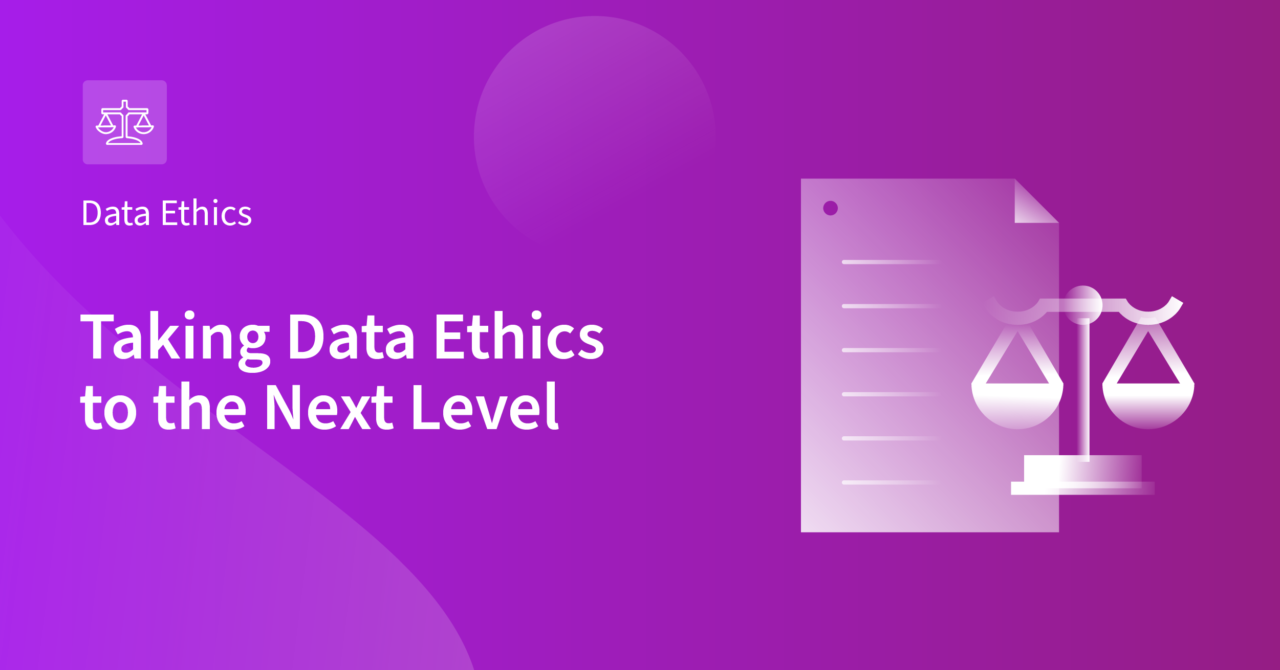Taking Data Ethics to the Next Level

We’ve previously written about operationalising data ethics, but we want to return to this topic and outline the challenges that remain in driving industry-wide adoption.
First, it’s important that we revisit what data ethics actually means. It describes value judgments and approaches when generating, analysing, and disseminating data and promotes responsible use of data and innovation. Whilst some progress has been made, we believe that the discourse around data ethics remains underdeveloped, especially when compared to the massive growth in data-centric financial services.
Here at Mudano we continue to push for key stakeholders across the financial services industry to engage with this critical area and contribute their voices. Momentum is building, but there is much work left to be done to ensure that the financial services industry recognises the critical importance of this issue.
Changing the narrative
From our dealings with management at large financial services organisations, it’s clear that senior decision-makers acknowledge the importance of data ethics. This isn’t just about mitigating reputational risk and protecting the brand from damage through data breaches and scandals – it’s about exploiting opportunities to build strong relationships with regulators and drive positive change at a macro level, enabling the entire industry to do more with data.
There are widespread concerns about the encroachment of AI into our lives – responsible data management can help to counter anxieties and drive beneficial outcomes. A well-defined and articulated approach to data ethics enables financial service brands to reduce bias in collecting data, increase transparency, define ownership of data and a host of other benefits. And it enables them to change the narrative around data itself.
A lack of movement
But the conversation is shrouded in uncertainty. This is really a problem of definition – without a common language, it’s hard to facilitate comparison and drive adoption across the industry. Whilst there are many talented policy-makers and regulators who care deeply about this topic, they have struggled to create traction on an official level.
The result is a lack of buy-in and movement from regulatory and industry bodies, creating a vacuum where indecision and inaction thrive. Nobody is willing to put their reputation on the line by saying “this is what you need to do”. As a result, the industry and its relationship with consumer risks being stymied and held back.
We have previously advocated building a data ethics framework that can be part of firms’ wider data management strategies – and integrated with individual business units within financial services organisations. Our view here remains unchanged – with opportunity, comes responsibility. If firms want to unlock the power of data, they should embrace data ethics as a way of unleashing that power.
Push and pull
There is general industry consensus that data ethics – simply put, being robust and transparent about ethical usage and creation of data assets, algorithms, usage and so on – can help build brand and reputational value. This is a clear pull factor that we must build upon to drive adoption. But we need to work on push factors, too. Right now, there is no formalised regulation to inform data ethics. This makes it hard for organisations to structure and implement relevant practices (indeed, it’s a key reason why they rely on Mudano for help).
In our experience, firms are leveraging their existing committee structures to support data ethics governance. But ownership of implementation typically resides with the central data team, which lacks formalised definitions of accountability and responsibility for data ethics practices across the wider business. This lack of alignment creates problems with adherence and risks undermining the entire process of data management. The fact remains that measurement and reporting a work in progress for many firms, who struggle to quantify data ethics efficacy.
Clearly, there is much more wood to chop when it comes to embedding data ethics within large-scale organisations. As firms develop their data ethics practices they should consider how to encourage a proactive data culture. As more and more organisations strive to become purposeful organisations, and the importance of purpose only grows from a brand and business perspective, the concept and issues of data ethics, or responsible AI will only become greater with or without regulatory guidance.
The importance of leadership
At Mudano, we believe more can and should be done to ensure that data ethics is at the forefront of the industry’s drive towards becoming fully data-centric. The establishment of a clear body – or at least a line drawn in the sand which states “this is what you need to do” – is urgently needed to protect the industry and position it for growth in this new data-driven business landscape. But the industry can’t wait for this to happen from the top-down; it needs to make it happen by driving change from the bottom up.
This is going to require strong leadership at the highest level. Management of leading financial institutions can’t afford to wait for “the next GDPR” – they should engage now and assess what data ethics means for their businesses and the broader industry. Considerations of ethical issues at each stage of the data lifecycle – collection, use, and retention – will foster public trust, help manage risk, and create unparalleled commercial opportunities. By taking the front foot on data ethics, organisations can help to steer their businesses and the industry towards the right path, while at the same time improving their brand status.
Seen through this lens, data ethics should not be looked upon as a brake on growth. Rather, it’s an accelerator. And it’s time we all put our foot down.
